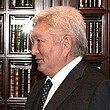Kyrgyzstani parliamentary election, 2010
|
|
|||||||||||||||||||||||||||||||||||||||||||||||
|
|||||||||||||||||||||||||||||||||||||||||||||||
|
|||||||||||||||||||||||||||||||||||||||||||||||
|
|||||||||||||||||||||||||||||||||||||||||||||||
Vacant
Early parliamentary elections were held in Kyrgyzstan on 10 October 2010. All 120 seats of the Supreme Council were elected by the party list system. Seats were allocated to all parties who obtained more than 5% of the vote and more than 0.5% in each of the nine provinces, capped at 65 seats per party.
Ata-Zhurt won a plurality of seats, while the ruling Social Democratic Party finished second and Ar-Namys came third.
In April 2010, President Kurmanbek Bakiyev was ousted, which brought to power an interim government led by Roza Otunbayeva. An election and reform plan was unveiled on 19 April 2010. A referendum in June overwhelmingly approved a reform to turn the country from a presidential system to a parliamentary system. The new constitution would allow the parliament to choose a prime minister and also to play a key role in forming the new government.
Kyrgyzstan's geostrategic location is vital because it supplies the War in Afghanistan through the Manas Air Base, and it is also the only country to host both an American and Russian base. Political developments in 2010 also pleased the US but were an annoyance to Russia, who warned that the first parliamentary democracy in Central Asia could be catastrophic for Kyrgyzstan. Russia also considers the area as its sphere of influence.
...
Wikipedia



